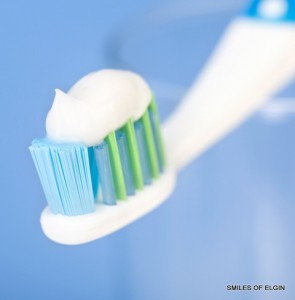1209 Dundee Avenue Elgin, IL 60120
Fluoride
Fluoride is a key ingredient in many popular brands of toothpaste, oral gel, and mouthwash, and can also be found in most community water supplies. Though fluoride is an important part of any good oral care routine, overconsumption can result in a condition known as fluorosis. The pediatric dentist is the one who will monitor and provide adequate doses for the child.
Fluoride fulfills two important dental functions. It helps to staunch mineral loss from tooth enamel, and it promotes the remineralization of tooth enamel.
When carbohydrates are consumed, oral bacteria feed on them and produce harmful acids. These acids attack tooth enamel – especially in children who take medications or produce less saliva. Repeated acid attacks result in cavities, tooth decay, and childhood periodontal disease. Fluoride protects tooth enamel from acid attacks and reduces the risk of childhood tooth decay.
Fluoride is especially effective when used as part of a good oral hygiene regimen. However, in order for the fluorides to work properly, good oral hygiene habits are necessary as well as the healthy balanced diet.

How much fluoride is enough?
Since community water supplies and toothpastes usually contain fluoride, it is essential that children do not ingest too much. For this reason, children under the age of two should use an ADA-approved, non-fluoridated brand of toothpaste. Children between the ages of two and five years old should use a pea-sized amount of ADA-approved fluoridated toothpaste on a clean toothbrush twice each day. They should be encouraged to spit out any extra fluid after brushing. This part might take time, encouragement, and practice.
The most common symptom of fluorosis is white specks on the permanent teeth. Children over the age of eight years old are not considered to be at-risk for fluorosis, but should still use an ADA-approved brand of toothpaste.
Does my child need fluoride supplements?
The dentist will ask questions in order to determine how much fluoride the child is currently receiving, gain a general health history, and evaluate the sugar content in the child’s diet. If a child is not receiving enough fluoride and is determined to be at high-risk for tooth decay, an at-home fluoride supplement may be recommended by the pediatric dentist.
Topical fluoride can also be applied to the tooth enamel quickly and painlessly during a regular office visit. There are many convenient forms of topical fluoride, including foam, liquids, varnishes, and gels.
Office Hours
| Monday | 10:00 to 6:00 |
| Tuesday | 10:00 to 6:00 |
| Wednesday | 11:00 to 8:00 |
| Thursday | 10:00 to 6:00 |
| Friday | 10:00 to 6:00 |
| Saturday | 8:00 to 3:00 |
| Sunday | Appointment only |



Recent Comments